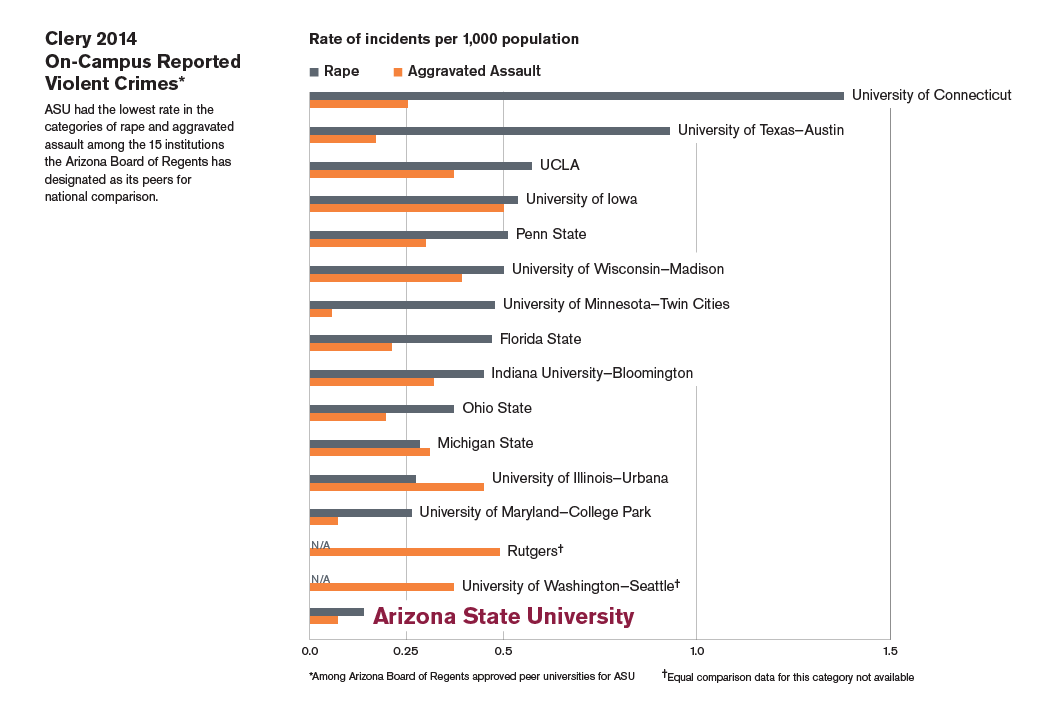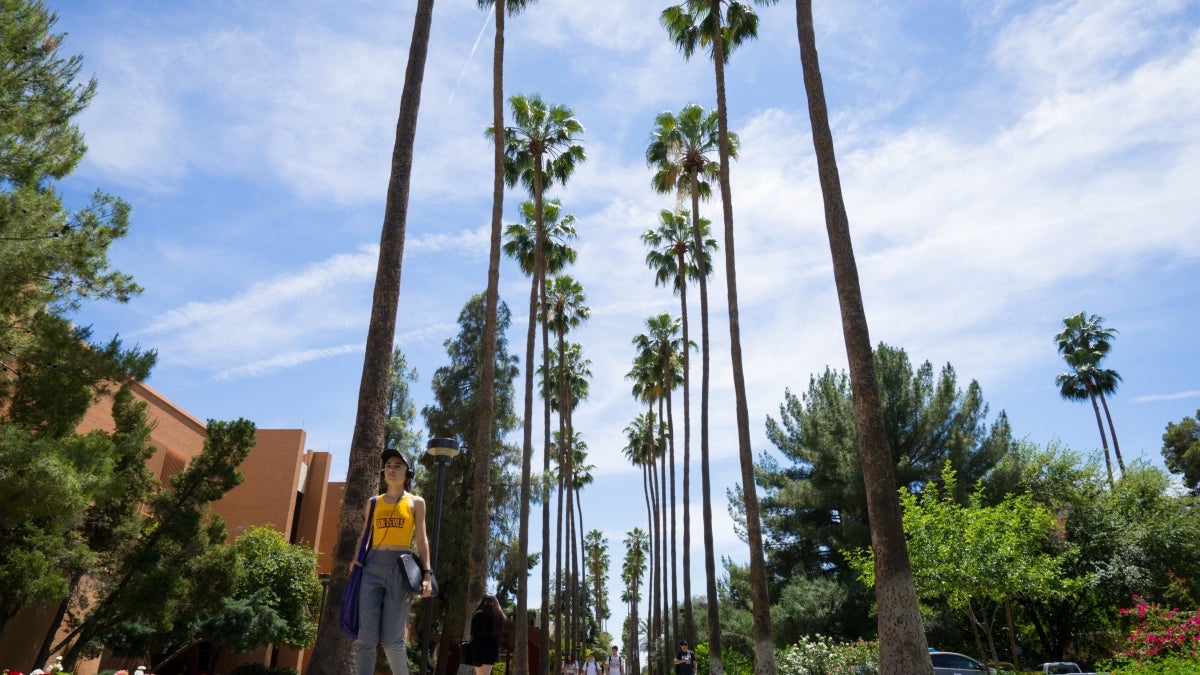Arizona State University recorded the lowest rates in violent crimes over the past two years among its peer institutions, according to data submitted to the U.S. Department of Education.
Among the cities that surround those universities, the city of Tempe, home to the largest of ASU’s five campuses, ranked near the middle in the five most serious offenses tracked by the FBI. The host cities range from large metropolitan areas, such as Los Angeles, to small-town settings, such as State College, Pennsylvannia.
The statistics factor into a national debate about how crime is reported on college campuses. The federal Clery Act requires schools to report only offenses that occur within campus boundaries, and some lawmakers and advocates want a broader picture for assessing safety.
The overriding conclusion that criminologists and analysts draw from campus and city crime data is that campuses tend to be the safest place in town, said Chris Blake, executive director for the International Association of Campus Law Enforcement Administrators.
“There is longitudinal data from the Department of Justice,” Blake said, “that demonstrates campuses are far safer places than the general society.”
Looking at Clery data, ASU had the lowest rate in the categories of rape and aggravated assault among the 15 institutions the Arizona Board of Regents has designated as its peers for national comparison. No homicides occurred inside any of the campuses, so that category was omitted from analysis.
“When students enroll at ASU, they and their parents rightfully expect us to do everything we can to keep our students safe,” said ASU Police Chief Michael Thompson. “We are constantly working on new strategies and techniques to improve safety.”
The Clery Act requires annual disclosure of campus crime statistics and security information by postsecondary institutions. All schools must report stats in 22 crime categories, ranging from murder to liquor law violations. Crimes are also grouped by location — whether they occurred on campus, in nearby public property or off campus.
ASU’s report is available here.
In addition to the more violent crime categories, ASU ranked eighth in robbery among the 15 schools the Arizona Board of Regents identifies as peer institutionsThe ABOR-designated peer universities are: University of California-Los Angeles, University of Connecticut, Florida State University, University of Illinois at Urbana-Champaign, Indiana University-Bloomington, University of Iowa, University of Maryland-College Park, Michigan State University, University of Minnesota-Twin Cities, Ohio State University-Main Campus, Pennsylvania State University-Main Campus, Rutgers University-New Brunswick, University of Texas at Austin, University of Washington-Seattle Campus and University of Wisconsin-Madison., ninth in motor vehicle theft and 12th in burglary.
The data showed that reports of aggravated assault, burglary and motor vehicle theft at ASU in 2014 decreased by more than half in each category. The university reported an increase in robberies from six in 2013 to 10 for all metro Phoenix-area campuses (then numbering four) in 2014.

Even among institutions that may not qualify as peers, ASU ranked low in violent crime. ASU ranked seventh and eighth out of 10 respectively in the rate for rape and aggravated assault among the nation’s 10 largest schools listed in U.S. News and World Report.
Scott Decker, a criminology professor at ASU and expert on crime statistics, said the concerns over looking only at data within campus boundaries are understandable but that there is a danger in trying to create broader boundaries for assessing crime rates. Extending the geographic area analyzed for crime to try to include off-campus student activity most likely is an arbitrary judgment.
“Crime data, like voters in legislative redistricting, can be grouped in a variety of ways. The key question is where the boundaries are drawn and why they make sense,” Decker said. “Boundaries can be drawn to support a variety of conclusions. Where do you stop on the map? Where do you draw the line?”
Many students on ASU’s Tempe campus live in off-campus housing that would be included in Tempe’s reports but not in ASU’s reports to the Department of Education. But looking at crimes off campus also encompasses areas and events where few students may go. Tempe Town Lake, near campus, is the location of dozens of special events each year, drawing hundreds of thousands of visitors and a corresponding increase in reports of crime, yet many of those events draw few students, Decker said.
ASU also operates other campuses in the Phoenix area that vary dramatically in size and surroundings, from the densely populated Downtown Phoenix campus to the expansive surroundings of the West and Polytechnic campuses. Expanding the area for recording criminal offenses beyond one campus’ boundaries fails to account for the others, Decker said.
“A shopping center near campus undoubtedly accounts for a measurable number of car thefts,” Decker said. “But does that have any relevance to ASU students, most of whom do not have cars?”
Thompson emphasized the strong collaboration between ASU and Tempe police. He also highlighted the various tools at their disposal, such as safety videos on the university website, and methods of contacting police for immediate assistance, such as emergency call boxes throughout campus and the LiveSafe app that can be used to contact police, provide tips and even get an escort home.
More University news

School of Molecular Sciences faculty member honored for contributions to photochemical sciences
Regents Professor Ana Moore, acclaimed faculty member of the Arizona State University School of Molecular Sciences, has been named the 2025 recipient of the prestigious George S. Hammond Award from…

ASU program recognized as a Center of Actuarial Excellence
Arizona State University’s actuarial science program is now recognized by the Society of Actuaries as a Center of Actuarial Excellence (CAE).There are currently 242 actuarial science programs across…

Edison Awards announces Michael M. Crow as 2025 Achievement Award honoree
FORT MYERS, Fla. — The Edison Awards, an organization dedicated to honoring the world's most innovative new products and services, is pleased to announce Michael M. Crow, president of Arizona…
